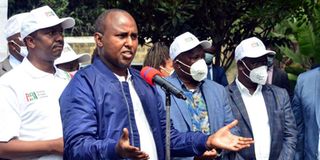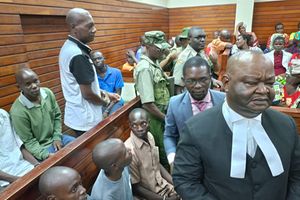BBI: MPs demand referendum cash

BBI Secretariat co-chairman Junet Mohamed (center) makes his remarks at the secretariat offices on December 10, before the handover of BBI signatures to the IEBC.
What you need to know:
- Mr Chebukati said the commission will not move an inch until funds are provided for them.
- After the verification of signatures, the IEBC will submit the Bill to the 47 county assemblies and the regional houses will have three months within which to consider the Bill.
MPs allied to President Uhuru Kenyatta and Orange Democratic Movement (ODM) party leader Raila Odinga now want Treasury to release funds for the verification of BBI signatures without parliamentary approval.
This, the MPs said, was to avoid delaying the process crucial to the referendum given that the National Assembly is on recess until next year.
The Independent Electoral and Boundaries Commission (IEBC) has three months, with the timeline having kicked off on December 10 when the signatures were submitted to the agency, to ensure that the Building Bridges Initiative (BBI) referendum bid is backed by at least one million registered voters.
“Treasury is mandated under Article 223 of the constitution to spend resources and notify Parliament to regularise this expenditure in a supplementary budget within two months or if the House is in recess, within two weeks after it is back. Nothing, therefore, stops Treasury from releasing the money to the IEBC to verify the BBI signatures. Nothing also stops IEBC from starting the process right away as they await funds,” Budget and Appropriations Committee chairman Kanini Kega told the Nation yesterday.
While IEBC chairman Wafula Chebukati did not state how much they will require for the verification, the agency had asked for Sh35 million to verify signatures by the Dr Ekuru Aukot-led Punguza Mzigo initiative last year.
Hire staff
“What the IEBC needs is not really a lot of money. They already have the staff and the infrastructure and the little extra they need is just to hire a few additional staff. So it should not be a problem,” said Mr Kega, who is also the Kieni MP.
Yesterday, Amani National Congress (ANC) leader Musalia Mudavadi called for the hasty conclusion to the BBI process, likening it to a boil that just had to be pricked “for the body to heal.”
‘The boil is ripe’
“We have been talking about BBI for two-and-a-half years. We cannot talk about it forever. The boil is ripe now. Let us lance the boil until it all comes out so that we can have healing. We must now prick the boil for us to heal,” Mr Mudavadi told congregants yesterday at the Friends Church Ofafa Jericho in Makadara constituency, Nairobi.
“When the second report of the BBI came out, we had a problem and we called for amendments. We did not waver. Now, 80 percent of our issues have been addressed and we want to finish with BBI and get back to recovering our economy.”
Nairobi senator Johnson Sakaja, who attended the same church service, lauded the removal of the proposal in the second BBI report, before it was amended, to entrench the transfer of county functions to the Nairobi Metropolitan Services in the constitution.
“We have insisted that you cannot solve a temporary problem with a permanent solution. We want Nairobi to enjoy devolution like all the other 47 counties. We are happy that we were heard on that and we also got 12 new constituencies,” said Mr Sakaja. The BBI team estimates that the referendum will happen between April and June.
For the actual plebiscite where Kenya’s over 20 million registered voters will have a chance to have their say in the BBI constitutional drive, IEBC has quoted Sh14 billion as its cost, a sum Mr Odinga has criticised, saying Sh2 billion will be enough if the commission eliminated wastages.
BBI secretariat co-chairs Junet Mohamed and Dennis Waweru on Thursday submitted 4.4 million signatures to the IEBC after they weeded out 800,000 entries in the list they said had errors.
“For ease of processing, and because we need the IEBC to take the shortest time possible, we have given you a soft copy version of these signatures,” said Mr Waweru, who is also the former Dagoretti South MP.
Mr Chebukati said the commission will not move an inch until funds are provided for them.
“We shall now proceed and request for a budget from the National Treasury. As soon as we get the budget, then we shall now get a team. We have a referendum committee which will undertake the exercise of signature verification,” Mr Chebukati told journalists outside the IEBC offices in Nairobi when they received the signatures in batches from each of the 47 counties.
The verification, Mr Chebukati said, will entail ensuring that those listed are actually registered voters in existing polling stations s.
In the Punguza Mzigo case, the commission published the list of the 1.4 million the team said supported the initiative and gave Kenyans 21 days to verify that their names were not listed in error if they had not appended their signatures.
After the verification of signatures, the IEBC will submit the Bill to the 47 county assemblies and the regional houses will have three months within which to consider the Bill.
If more than half (24) pass the Bill, it will be introduced to the Senate and the National Assembly.
This means the least time Parliament can take is 90 days, assuming all the other process are cramped into one day after the immovable deadline between the first and second readings.





